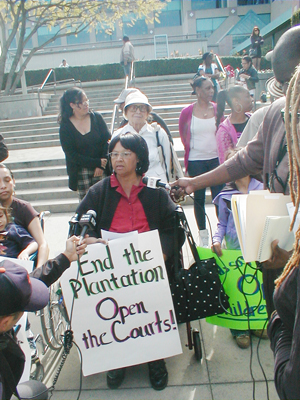By Charlene Muhammad CHARLENEM

LOS ANGELES (FinalCall.com) – Mother and child advocates are celebrating a judge’s decision to open L.A.’s child dependency courts to the news media. The courts adjudicate cases related to children, child welfare agencies and families.
Judge Michael Nash, the presiding judge over L.A. County’s Juvenile Court, ordered the secret courts open on January 30. Activists hope his efforts to improve accountability and transparency will help to better protect the county’s most vulnerable population.
Judge Nash’s order allows members of the press access to Juvenile Dependency Court hearings unless that access is harmful to children’s best interest. Anyone can object to a reporter’s presence at a hearing and judges would have to decide whether a “reasonable likelihood” of harm exists.
Some members of the public could attend hearings at children’s requests and with their consent. Others may attend hearings if the court determines they have direct or legitimate connections to the case.
“While this is a step in the right direction of truly opening the courts, ultimately the public must be afforded the same rights as the press to have access to the courts,” said Margaret Prescod, spokesperson for DCFS-Give Us Back Our Children and the Every Mother is a Working Mother Network.
Ms. Prescod said the groups have long-supported the call to open the Children’s Court because it was operating like a military court.
“People were making decisions, especially for babies and particularly for Black children, and removing them from families simply because they were poor. But being poor doesn’t mean you don’t love your child,” Ms. Prescod told The Final Call.
There is a need to be mindful of children’s and families’ concerns about privacy but Judge Nash’s ruling lifts the veil of secrecy by allowing impartial people in, as opposed to lawyers and case workers who may be requesting closed hearings to cover up their own deficiencies, she said.
“The reality is, family members, grandmothers, have been kept out of courts and there’s been a cultural insensitivity in keeping extended families and advocates out. People will see what’s going on and really be shocked,” Ms. Prescod said.
Children who should remain with families are stripped away and others who should have been removed were not, and subsequently have died, she charged.
Judge Nash’s ruling is another indication that open courts work, said to the National Coalition for Child Protection Reform. According to the group, only a few states have open courts, but they are among the largest states–New York, Texas, Illinois and Florida are among open court states. Opening L.A.’s courts means that nearly half of America’s foster children, approximately 19,000, will live in a jurisdiction with open hearings. Opponents of open juvenile courts argue the problem that needs fixing is not access, but a lack of resources, training, heavy caseloads, and poor communication between agencies.
Some, like the National Association of Social Workers California Chapter, argue that courtrooms are frightening enough for children without adding more strangers. They also worry the privacy of social workers is at stake.
The decision is long overdue, said Dr. Didra Brown Taylor, research professor at Charles R. Drew University of Medicine and Science in Los Angeles. She is also a member of the Black Community Task Force, which advocates for foster care children and their parents.
The only way to get answers to untold questions and to better assist families is for the courts to be open, she said.
Dr. Brown Taylor said part of her concern is the way court-appointed attorneys represent families. “When a child is removed from the home, parents are to receive a trial within 15 days, but what they don’t know is, once they plead, the trial factor goes away and so do their children,” Dr. Brown said.
“The injustices happen before many parents get to court. In their heart of hearts, they want to fight … What this will mean for the actual children in the best case scenario is that fair and balanced attorneys and the media will be able to put forth a truthful story about what’s happening in those courts,” Dr. Brown Taylor said.












